India leads the world in large-scale adoption of this natural, non-invasive health system offering remedies that rebalance mind, body and vital force
In our multi-part article, homeopathic doctor Vatsala Sperling explains how Indian doctors take the practice to a whole new level. Her long interview with Dr. Mahesh Gandhi (below) introduces an innovative application of its modalities to mental health, an area in which Western medicine provides little hope beyond masking symptoms with drugs.
VATSALA SPERLING
“WHAT YOU LEARNED IS A HANDFUL of dirt, what you haven’t learned is the Earth.” I grew up hearing my mother repeat this quotation from Avvaiyar, the Tamil poet-saint, while she tried to make education fun for me. This idea, planted firmly in my mind, has enabled me to study homeopathy and establish a practice in the US where a small part of my clientele are people with unresolved psychological and emotional issues. I have found homeopathy to be harmonious with my Hindu and Saivite upbringing. Most of my homeopathy teachers, including Dr. Divya Chhabra, are from India. When Dr. Divya invited me to her clinic in Mumbai to learn her unique homeopathic case taking method, “Leap to the simillimum” (for finding the remedy that is most likely to restore health), I accepted readily and wondered if I might discover how Indian practitioners use homeopathy to address mental suffering.
Soon after reaching Mumbai, I hailed a cab for Sun and Sand hotel, Juhu. En route, I conversed with the cabbie, Mehboob. After learning that I am a homeopath visiting India to further my education, Mehboob showed me a card, “For Rs. 80 per year, this card lets me receive unlimited homeopathic treatment for myself and family in a clinic run by Punjab Kesari, a social work organization.” Unexpectedly, within minutes of my arrival in India a cabbie was telling me about his devotion to homeopathy: “I swear by God—after experiencing deep healing from homeopathy, you will not look elsewhere.”
“Deep healing” became a much-contemplated concept during my stay. Dr. Divya told me, “For deep healing, you must go past human delusions, cross the metaphoric wall separating the conscious from the unconscious and find the remedy that is revealed from the patient’s unconscious mind.” She explained that her practice of classical homeopathy is based on the teachings of Jung and Freud and their understanding of the unconscious mind.
Homeopathy was founded by Dr. Samuel Hahnemann, MD (1755-1843) while trying to understand the mechanism of the medicinal action of Peruvian bark in the treatment of malaria. After decades of experimentation, Hahnemann established homeopathy as a medical science based on natural laws; for example, the Law of Similars. He recognized disease as a dynamic disturbance in the vital force. To counteract the disease state, he created a method of dilution and succussion that resulted in dynamization of raw medicinal substances so that a dynamic disease state could be cured by a dynamic remedy, when it is selected on the basis of the Law of Similars. Beyond this, he gave no further explanation.
Presently, nanotechnology is able to measure changes in coherence and cluster formation of water molecules when they are exposed to electromagnetic energy and demonstrate that the dynamic process of serial dilution and succussion creates an energy field that enables water molecules to memorise the substance they have come in contact with. Based on this memory, a water molecule cluster formed after exposure to gold is totally different from clusters formed after exposure to sea salt. These unique water clusters are used in preparation of homeopathic remedies; and when given on the basis of the Law of Similars they are able to disperse in the body via fluids, and convey the information of the healing potential of the raw substance they have come in contact with, and elicit clinically, subjectively and objectively observable changes in symptoms.

Dr. Bhawisha and Sachindra Joshi: This innovative husband and wife treat the whole person, not just the immediate diagnosis
Though Hahnemann did not have the scientific vocabulary and technology of the 21st century, he had created a new system of medicine. Patients came to him from afar. With a non-invasive, natural, logical and straightforward approach, he cured the sick and re-established balance in their vital force.
Hahnemann’s work spread worldwide. In the early 1900s, the American Medical Association teamed up with pharmaceutical companies and suppressed medical doctors in the US from practicing homeopathy. Anti-homeopathic groups calling themselves “scientific” began spreading misinformation: “Homeopathic remedies are diluted to the point that they do not contain even a molecule of the medicinal substance. How can they cure? Homeopathy is a placebo effect.” The natural laws that govern disease and health, the role of the vital force, clinical evidence and the unique method of choosing and preparing medicines that match the patient’s disease state were completely disregarded. To this day, opponents of homeopathy brush aside evidence coming from nanotechnology laboratories of the Indian Institute of Science, research work on the memory of water, and the proofs from the laboratory of Nobel Laureate Luc Montagnier. Truth be told, the burden of proof, for those seeking it, does not lie with homeopathy but rather with the 18th-and 19th-century mechanistic model of science whose limitations prevent it from seeing beyond the visible.
In India, homeopathy was never suppressed. Over 207 medical schools teach homeopathy, and over 100 million Indians use only homeopathy for their medical care. It is popular among the common people, like the cabbie, Mehboob, as well as celebrities. There are over 200,000 practicing homeopaths, and 12,000 graduates are added annually.
In terms of clinical application and research in homeopathy, India is the world leader. Prime Minister Narendra Modi has established AYUSH, a ministry that promotes Ayurveda, Yoga, Unani, Siddha, Homeopathy, Naturopathy and Sowa Rigpa as viable medical care systems for the country.
What makes homeopathy so successful in India? In my view, the Vedic and Ayurvedic understanding of man and nature prepares India to embrace and assimilate homeopathy, which has many principles and laws that are totally consistent with India’s ancient Vedic philosophy. Take for example what is called “case-taking.” This is the homeopathic science and art of listening, observing, asking questions and conducting extremely detailed inquiry about the presenting complaint, its time-line, and the entire personality of the patient so that a highly individualized picture of the state of their body, mind and emotions emerges clearly. This information allows the homeopath to understand the disease process and choose an individualized remedy on the basis of the law of similars that would restore balance to the vital force.
While staying true to the principles of homeopathy, Indian homeopaths have pioneered many different case-taking and treatment methods suitable for our complex and hectic modern life. For example, Dr. Bhawisha and Sachindra Joshi, my teachers, have come up with a method of plotting human maturity, growth and developmental stages on a periodic table grid as used for the elements. They have extended the same idea to the entire animal kingdom and used the natural behavioral patterns of animals for plotting them in a similar periodic table. During case-taking, they look for parallels between human and animal behavior as well as energies for selecting a suitable remedy from the animal kingdom for their patients.
Following this method, the Joshis have reported astonishing cures for many different ailments. The Joshis say, “Homeopathy is so individualized, it takes into account the entire personality of the patient. Irrespective of the case-taking method, it brings about deep and lasting healing. No matter what the disease is—tonsillitis, eczema, asthma or depression—in every single case, when we consider the whole person and not just their diagnosis, we can prescribe remedies that remove the problem from inside out without any suppression and side effects.”
Dr. Dinesh Chauhan an international teacher with a thriving charitable and volunteer work in India, has pioneered a “Scientifically intuitive case-witnessing process.” His style, an offshoot of the Sensation Method, is designed to ask a minimum number of questions to get to the simillimum. Once a remedy exactly similar to the core inner state of the patient has been achieved, Dr. Chauhan creates a space where the patient is able to observe his entire energy pattern and behavior. Dr. Chauhan claims that by mirroring the inherent patterns and energies back to the patients, the homeopathic healer becomes the very first simillimum to the patients. Dr. Chauhan reports that patients with severe psychologically disruptive states get better after undergoing the “scientifically intuitive case-witnessing process”—even before any remedy is administered—because now they themselves fully.
Indian homeopaths I have studied with have shown a deep understanding of the stages of human development, from gestation to death, but not just in terms of the birth, growth and death of the physical body. They understand the spiritual, mental and emotional development of human beings and how life begins in the creative principle of the feminine energy, moves through the seven chakras, and ends in the transformative principle of the masculine energy. Each of these energies, like Shiva and Shakti, is essential for the existence and completion of the other. Steeped in this knowledge, a homeopath is able to have a person describe his life narrative and express his experiences of family dynamics, gestation and birth process and the developmental stage, where he might be stuck and where he manifests disease symptoms. Then, receiving a homeopathic remedy that matches and reflects the developmental stage he is stuck in brings on profound healing.
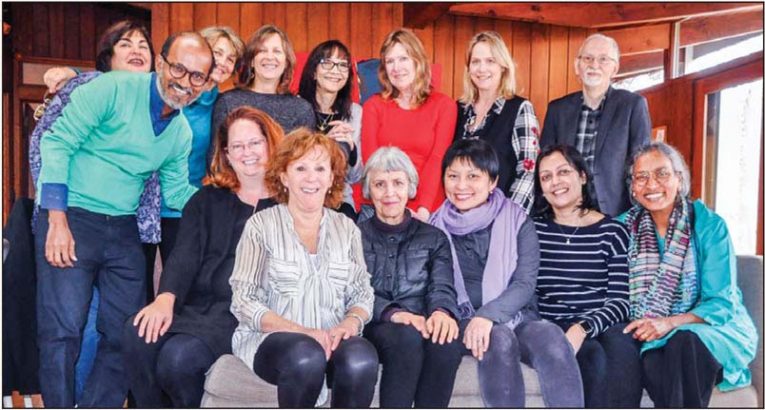
Sharing India with USA: Dr. Dinesh Chauhan (far left) meets with homeopathic practitioners in a Massachusetts seminar (our author is seated on the far right).

Dr. Divya Chhabra, one of the author’s teachers, with a clinic in Mumbai
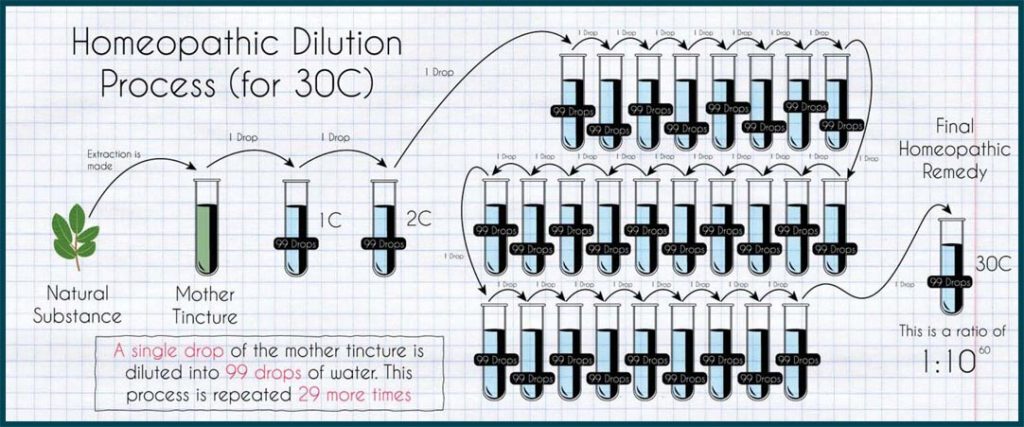
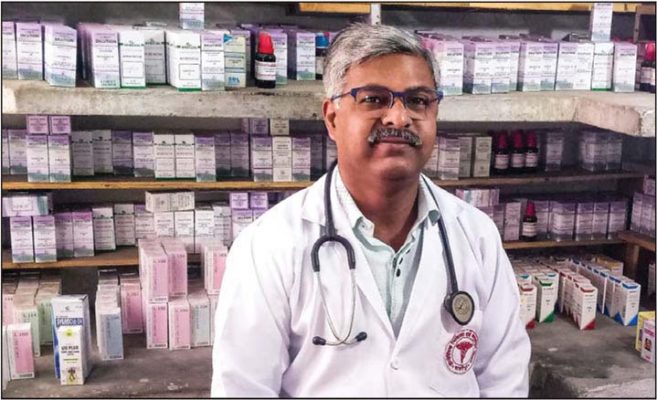
From plants, minerals and animals: Dr. Rajneesh Sharma MD, a homeopath, author and researcher from India, in his pharmacy full of homeopathic remedies. Elements from the natural kingdom form the basis of homeopathy’s thousands 0f remedies.
HOMEOPATHY, A LIFE PATH
I come from a background of hardcore science. With a doctorate in clinical microbiology, I have served as the chief of clinical microbiology services in a multi-specialty children’s hospital in India and worked for years alongside accomplished medical doctors and surgeons. I am a homeopath now because homeopathy speaks to my innate nature and view of life.
It occurs to me that, in being human, we are very much a part of nature, which encompasses other animals, minerals and plants. According to the Vedic enunciation, “Vasudhaiva kutumbakam,” The whole world is one family. When one component of nature suffers, other parts of nature offer salvation. Homeopathy has successfully grasped and employed this philosophical concept for the amelioration of human suffering.
From my homeopathic adventures in India, I returned home fully convinced that, truly, every client is a spiritual being on a path and stage of inner development that is unique to him; and in this moment in time he is experiencing illness due to an imbalance in his vital force. When a suitable homeopathic remedy is administered that mirrors the sick state, his vital force will shine once again and he will be well again. Both health and disease have a higher purpose. We can choose to view disease as a punishment or as an opportunity for learning the lessons we are meant to learn during our spiritual growth and development. Homeopathy allows for such contemplation and offers support to the vital force so that it can accomplish its higher purpose in life.
Homeopathy for Mental Disorders
During my stay at Dr. Divya’s clinic, she learned about my interest in approaching mental health issues using homeopathy. She told me about a medical doctor and psychiatrist, Dr. Mahesh Gandhi, who uses homeopathy for treatment of mental illness. I wondered if he encountered and treated the type of psychological issues that I knew my Hindu brothers and sisters face in the USA. I contacted him for an interview for HINDUISM TODAY.
VS: How does homeopathy inform your chosen field of psychiatry?
MG: Psychiatry is based on a biological/chemical model of disease. Everything is seen as a disturbance in the body and the neurotransmitters. Psychotherapy and psychiatric analysis are time consuming. Before the 1950s, psychiatry was not a mainstream medical field. Since the 1950s, drug-based treatments have been giving quicker results. This progress has come at a price. Allopathy and psychiatry focus on the disease and lose sight of the patient as an individual. For every diagnosis there is a drug. When the root cause is not treated, a drug-based solution is temporary. Drug- and lab-test-based treatments are ok for acute infections and deficiency states; but for chronic illnesses, people must explore other options for their well-being instead of becoming drug-dependent. The suppressive nature of allopathy and psychiatry upsets people who want a drug-free and holistic approach to health. In homeopathy, patients are understood as individuals and listened to, and they feel a general sense of well-being.
VS: What are the various mental health issues you encounter in your practice?
MG: I see patients with anxiety, panic disorders, phobias, post-traumatic stress disorder, obsessive-compulsive disorder, bipolar manic depressive disorder, schizophrenia, paranoia, anorexia and bulimia, addictive tendencies, children’s problems—bedwetting, behavioral disorders, ADHD, autism, mental retardation—geriatric and sexual problems. With homeopathy, all these conditions respond beautifully. For some issues, homeopathy is best as the first-line treatment. I advise parents to see a homeopath before drugging their kids. With drugs, kids will get better only for a short time and the problem never goes away fully. Pharmaceutical companies bring out more and more drugs for younger and younger kids. It is a very risky and scary situation.
VS: What is the general awareness among people for homeopathy and its place in mental illness?
MG: Before I became a homeopath, patients came to me for drug-based psychiatric treatment. Now, with increasing awareness about side-effects, people refuse drugs and ask for homeopathy.
VS: Can grief, loss and abandonment issues be treated with homeopathy?
MG: Yes. I just saw a man in his 40s who lost his wife to cancer. He loves and idolizes his dead wife and will never let her go from his mind. Many psychiatrists have given him antidepressants, but he continued to grieve and be depressed. I told him that instead of remembering his wife with sadness, he can remember her with joy. During case-taking, I explored all areas of his life, his personality and relationships. I didn’t give him antidepressants. With a homeopathic remedy that matches his state of grief, now he remembers his wife with a happy smile.
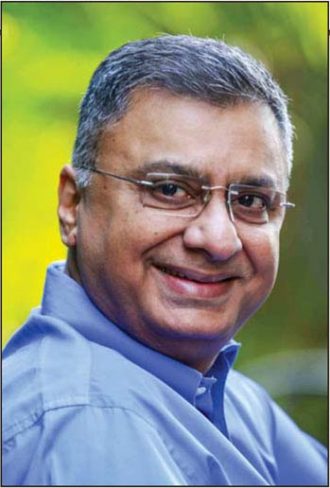
Dr. Mahesh Gandhi: He specializes in mental disorders
VS: Do you engage with patients in an empathetic manner? Mainstream medicine is about detachment, distance and impersonalisation.
MG: As a homeopath, I listen first, without giving advice about acceptance, logic, fate, destiny, karma and God’s role in our life. I do not lecture patients about cultivating gratitude and learning a lesson. I listen with deep empathy because the patient needs to be heard. Homeopathy deals with emotions and feelings. There is a human touch.
VS: Can homeopathy help people traumatized by sexual, familial and communal violence?
MG: When tragedy strikes, some people cannot forget and move on. They get stuck and experience trauma. One patient said to me that in her childhood a thief broke into her house and raped her at knife-point. She described this event very calmly. I asked her about her feelings during the event. She said, “I felt that my life is more important. I will let this crazy man finish his misdeed and go away. I will get over it and move on with my life.” In this case, this patient’s personal attitude helped her get over what could otherwise be described a highly traumatic event. When people come to me with various traumas in their background, I always check into their feelings and thoughts at the time when the event was happening. This gives me a clue whether they are stuck or have moved on. Assessing an individual’s response and reaction to a situation allows us to understand people as individuals; and at that point we can provide an individualized remedy to help them. In that way homeopathy is a very humanistic healing modality.
VS: How can homeopathy help patients with substance dependence and addictions? In the USA alone, 65,000 people died in 2016 from opioid overdose.
MG: Substance abuse and dependence is a reflection of the disturbance in the Vital Force. With homeopathy, we work to calm down the habits of self-medication by exploring the root cause that enables the patient to become dependent on the substance. Once the Vital Force is balanced, the habits go away and people don’t need crutches.
VS: Do people with gender-related trauma find help with homeopathy? In the West, gays, lesbians and transgender people are making headlines with their choices.
MG: Gender-related trauma is increasing in India. I do not treat people for their sexual orientation because it is not a disease. Some feel guilty for having attraction for the same sex, and with homeopathy their sense of guilt can be addressed without changing their orientation. In the end a person has to feel happy and OK with himself, irrespective of whether he spends his life with a woman or a man. I am not going to tell him his choice is right or wrong, or what choices he should make, but I will help him become comfortable and happy with his choice. To that end, homeopathy can help because homeopathy is totally patient-centered. They are not judged on the basis of morality, good and bad, right and wrong, social standards, stigmas and religious dogma. Sometimes a patient wants to know if I can change him as a person. My answer is no. Homeopathy does not turn a tiger into a cat or a cat into a horse. It just facilitates them to be a better version of themselves. That is the beauty of homeopathy.
VS: Do you find any similarity between ayurveda and homeopathy?
MG: In ayurveda, we have the concept of pancha kosha—annamaya (food), pranamaya (vital force), manomaya (mind), vijnanamaya (intellect) and anandamaya (bliss). When a person journeys from the outermost to the innermost fifth kosha, he can uncover his true self, the atman, and he might find the ultimate unity between atman and Paramatman. Amongst the five koshas, the three outer koshas are subject to change. The central kosha, anandamaya, is about sat-chit-ananda, and remains unaffected by the changes in the outer koshas. However, disturbances of the outer koshas can temporarily cloud the anandamaya kosha. When in too much pain and physical suffering, it becomes difficult to remain focused on the inner bliss. When you throw a coin in a pond, so many ripples are made that you cannot see the bottom. When the water settles, you can see the coin and the bottom. As homeopaths, we remove the ripples and imbalances of the annamaya, pranamaya and manomaya koshas so that their functions and expressions change for the better. In a way, we homeopaths help our patients with their true spiritual purpose and help them move toward their anandamaya kosha. This is the ultimate goal of human beings on the Earth.
Both ayurveda and homeopathy are holistic. Both work on the core constitution, the koshas, and both recognize the unique energetic patterns of an individual. Ayurveda talks about balance of vata, pitta and kapha. Homeopathy recognizes the imbalance of wind, bile and phlegm and considers changes in these for selection of remedies. Both systems advise about lifestyle and habits. Sick people experience abnormal cravings and desires, such as craving for sugar, salt, stimulants and unhealthy foods. In this picture, healthy diets and habits, exercise and clean environment all have a place alongside homeopathic medicines. With highly individualized homeopathic treatment, people begin to make healthy choices and invite health-promoting habits and energies into their life.
VS: Can allopathic and homeopathic medicine work together?
MG: The allopathic medicines are material doses of chemicals. Homeopathy is energy medicine. Material medicine and energy medicine work at different levels. Material medicine (allopathy) affects the body. It is good for accidents and emergencies. Energy medicine (homeopathy) affects the Vital Force. It is good for managing chronic cases and deep-seated emotional and mental disturbances. They can be used side by side. Every stream of medicine has its place in healthcare.
VS: What is your approach to patients who want to stop medications?
MG: Weaning off drugs is possible. It should be done gradually under expert supervision.
VS: Many old cultures believe that possession by malevolent entities results in mental illness. Any comments?
MG: Psychiatry was built upon the concept of entity possession. In India we think we are haunted by our karma. In Hahnemann’s time, mental health patients were considered possessed and were treated worse than animals. Those cruel practices were based on ignorance. Even now some people believe that mental illness is a form of possession by negative entities. Some mental health patients are convinced that they are possessed, and therefore they behave in an aberrant manner. I try to educate them as needed. In the homeopathic repertory and materia médica, we have a huge section on mind, fears, delusions, illusion, and various other mental symptoms and behavioral anomalies that patients experience when they feel possessed. Homeopathy has a way of understanding these conditions and alleviating them by giving remedies.
VS: How can homeopaths give a hint to their patients about the side effects of drugs without picking a fight with the pharmaceutical companies?
MG: Leave the big pharma alone. Just practice good homeopathy. Let people decide what they want to use. People know about side effects. They are brainwashed into believing there are no alternatives to drugs. I tell them to explore holistic options. The same can be said about the skeptics. They do what they want; we do what we can.
VS: Any message for people who might have family members with mental health disease?
MG: Be open minded and hopeful. Many things can be done to help these patients. Homeopathy offers a safe, gentle, noninvasive, holistic and spiritually oriented alternative that is in tune with the ancient healing modalities like ayurveda. Be bold in your choice, and try homeopathy.
The Other Song Academy
Inspired by the Vedic view of the natural world, contemporary homeopathic thinker Dr. Rajan Sankaran has developed a homeopathic approach he calls the Sensation Method. He proposes that in the sick state, our Vital Force stops playing a healthy music that is natural to it and begins to play an erratic tune loudly. He calls it The Other Song and explains that the symptoms and sensations expressed by the body, mind and spirit during illness are nothing but the sounds of this erratic tune. This is how the Vital Force draws our attention to what needs to be healed and cured. In his research of over 30 years, Dr. Sankaran has found that erratic tunes of the human Vital Force are mirrored by the natural characteristics of the non-human components of nature, which can be used for preparing homeopathic remedies using Hahnemann’s method of trituration, dilution and succussion. During homeopathic case-taking by the Sensation Method, the patient—by way of expressing energy and describing his complaints—reveals, unbeknownst to himself, the specific source in nature from which his Vital Force draws an erratic tune for the expression of his symptoms. When a remedy indicated by the patient is administered to him as per the Law of Similars, he experiences a remarkable cure. Using Dr. Sankaran’s Sensation Method, practitioners from around the world report over 80% success rate in treating their patients.
During my stay in Mumbai, I visited Dr. Sankaran’s institute, aptly named The Other Song Academy, and met the dean, Dr. Meghna Shah, faculty members and a group of international students. Dr. Meghna pointed out, “At The Other Song Academy we provide comprehensive postgraduate homeopathic medical training and offer patients highly individualized homeopathic treatment in combination with meditation, yoga, lifestyle modification and balanced nutrition.”
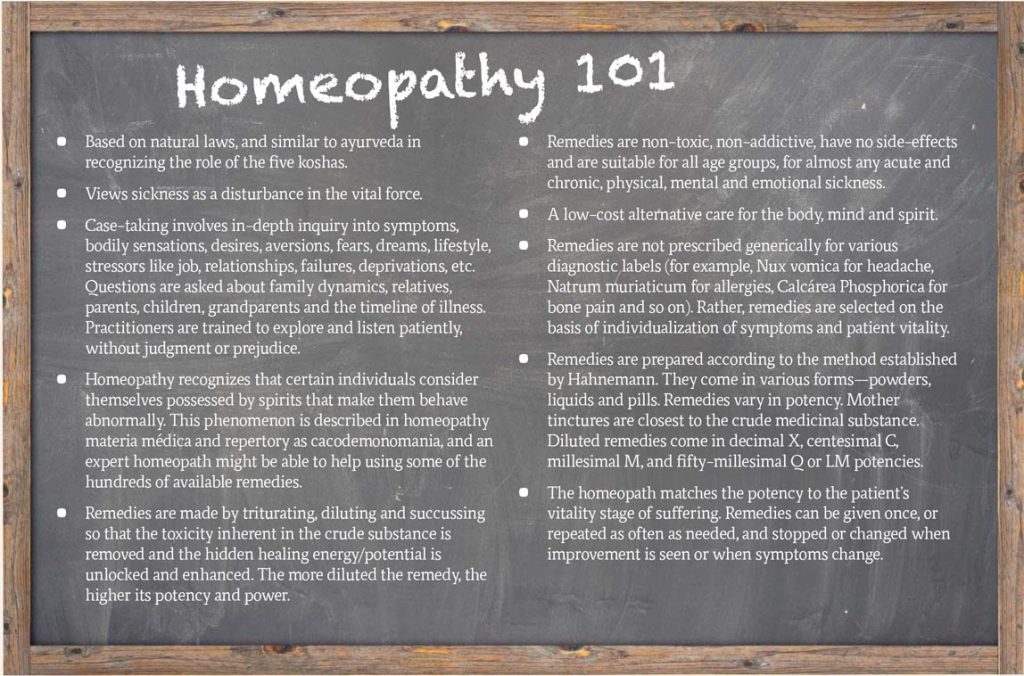

Using the sensation method: Dr. Rajan Sankaran (center, blue shirt) has assembled a team with dean Dr. Meghna Shah (back row, fourth from left)

More Resources
Homeopathy and Psychiatry: Personal Evolution Model, by Mahesh Gandhi, MD. 2017, www.drmaheshgandhiclinic.com
Homeopathy, Science or Myth: by Bill Gray, North Atlantic Press.
Organon of the Medical Art: by Samuel Hahnemann, edited by Wenda O’Reilly. 1996, Birdcage Press, California, USA.
Homeopathy for Today’s World: Discovering Your Animal, Mineral or Plant Nature, by Rajan Sankaran, MD. 2011, Healing Arts Press, Vermont, USA.
Explore Your Inner Human-Animal Connection: The Joshis’ Approach, by Bhawisha Joshi, MD 2014, www.drjoshisclinic.com
www.vithoulkas.com: Dr. Vithoulkas is credited with reviving homeopathy in the West after completing his homeopathic education in India.
dynamis.edu/teaching: Homeopaths Dr. Jeremy Sherr and his wife Camilla are homeopaths with great success in using homeopathy for treating over 40,000 AIDS victims in South Africa.

